Agriculture in Quebec: 7 Powerful Trends Shaping Its Legacy
When we think of agriculture in Quebec, our minds travel across sweeping fields that have shaped the province’s legacy. From dairy farms enriching local tables to world-class educational institutions and the proactive role of the Montreal chamber of commerce, agriculture in Quebec continues to stand as a pillar of Canada’s economy, history, and innovation. In this comprehensive exploration, we dive deep into the history of agriculture in Quebec, examine pivotal education and institutional trends, and track the profound impact of technological advancement and international collaboration.
A Brief History of Agriculture in Quebec
The province of Quebec has a deeply rooted agricultural tradition that dates to the era of New France. As settlers arrived in what would become Quebec City and its surrounding regions, the land was rich and the climate favorable for a variety of crops and livestock. Quebec’s evolution from subsistence farming to a commercial agricultural powerhouse forms a compelling story—a story entwined with educational advances, influential political figures, and strategic commercial leadership.
- The history of agriculture in Canada found one of its main loci in Quebec, especially in regions like Quebec City, Montérégie, and Eastern Townships.
- Early centuries were marked by small-scale farming, with a transition to larger, export-oriented production in the 19th century.
- The creation of agricultural boards in Canada and Quebec agricultural schools were pivotal milestones, further professionalizing and diversifying the industry.
Let us embark on a journey exploring both the roots and the soaring ambitions that define Quebec’s agricultural legacy.
The Educator’s Legacy: Shaping Quebec Agricultural Schools & Commerce
Our narrative would be incomplete without recognizing the contributions of a remarkable Quebec educator and political figure born in Quebec City in 1836, the grandson of Joseph-François Perrault. After early studies at the Petit Séminaire de Québec, he continued his education overseas at the University of Durham and the prestigious Royal Agricultural College in England, followed by agricultural studies at the École de Grignon in France.
Despite early setbacks in establishing Quebec agricultural schools upon returning to Canada in 1857 (mainly due to a lack of student enrollment), he became an influential force—serving as secretary to both the Bureau of Agriculture and the Board of Agriculture of Lower Canada. His editorial leadership of the Journal de l’agriculture et des travaux de la Chambre d’agriculture du Bas-Canada connected progressive farmers and policymakers alike.
- He was elected to the Legislative Assembly for Richelieu in 1863, playing a key political role.
- In 1885, he founded and strengthened the Chambre de Commerce du District de Montréal (Montreal chamber of commerce), providing a dynamic bridge between agriculture and commerce.
- His international vision was evident, representing both the chamber and the federal government at global agricultural exhibitions Canada was featured in, and was honored as a Chevalier in the French Legion of Honour.
These multifaceted contributions exemplify how education, political stewardship, and commercial savvy have set the stage for the seven powerful trends now shaping agriculture in Quebec.
7 Powerful Trends Shaping the Legacy of Agriculture in Quebec
Let us delve into each current and historical trend that defines agricultural excellence in the province. These trends demonstrate the profound adaptability and ingenuity that characterize Quebec’s agricultural scene—infused with historical experience, cutting-edge technology, and global vision.
1. Crop Diversification Takes Center Stage
Originally a wheat-and-livestock economy, Quebec agriculture has undergone remarkable diversification. Today, we see fields filled with corn, soybeans, berries, apples, vegetables, and high-value niche crops. This shift dramatically reduces economic risks for farmers and meets both local and international market demands.
- The number and type of crops grown in the province have continually expanded, especially post-1960, following major agricultural reforms.
- Dairy remains vital, but greenhouse produce and fruits are on the rise, feeding both Quebecers and export markets.
- Modern diversification also empowers sustainability goals and the integration of advanced farm management tools, such as those provided by Farmonaut’s technology.
Tracking crop performance and soil health has never been easier thanks to satellite-based monitoring. Learn more about precision tools powering modern crop diversification in Quebec by exploring Farmonaut’s Large-Scale Farm Management solutions.
2. Agricultural Education Initiatives in Quebec
Agricultural education in Quebec has a rich tradition, influenced by European models and supported by both provincial and private institutions. From agricultural schools inspired by the renowned Royal Agricultural College in England and École de Grignon in France, to leading Quebec universities, education remains the bedrock for innovation and knowledge transfer.
-
Historic schools and journals:
- The attempt to set up Quebec agricultural schools, coupled with the publication of the Journal de l’agriculture, reflected a commitment to spreading best practices and modern science.
-
Modern advancements:
- Institutions like Université Laval continue this legacy, blending research with applied farming. Today’s curricula emphasize sustainability, agri-business, and digital technologies.
-
Ongoing technological integration:
- Modern platforms, such as Farmonaut, allow students, researchers, and practitioners to access real-time data for both learning and applied management.
Explore more about advanced agricultural education tools like real-time crop health monitoring and API-based advisory systems now available to both students and professionals on the Farmonaut platform.
3. Montreal Chamber of Commerce and Quebec’s Global Role
The Montreal chamber of commerce stands at the crossroads of agriculture, industry, and international trade. Since its origins in 1885, fueled by educated leaders from Quebec City and beyond, the chamber has provided vital advocacy, networking, and global representation.
- It represented Quebec and Canada at numerous international exhibitions, showcasing Canadian farm produce and industrial capacity.
- Through ongoing partnerships with both the federal government and provincial stakeholders, the chamber continues to drive innovation and exports.
- Modern commerce initiatives often intersect with traceability and sustainability requirements, where tools such as Farmonaut’s blockchain-based traceability solutions ensure transparency and trust in high-value supply chains.
The chamber’s impact extends beyond Montreal—helping position Quebec as a global leader in agri-food, trade, and innovation.
4. Technological Transformation in Quebec Agriculture
If we look at agriculture in Quebec today, modern technology drives real change—from satellites and AI, to sustainability analytics and blockchain. Farmonaut exemplifies these breakthroughs, offering farmers access to high-resolution satellite data, AI-based crop advisory, and efficient resource management, regardless of farm size.
- Satellite-based crop monitoring provides near real-time views of fields, helping us manage irrigation, fertilizer, and pest control with precision.
- AI-driven advisory systems, such as Farmonaut’s Jeevn AI, analyze multi-source data to deliver weather, pest, and crop management tips.
- Blockchain-enabled traceability helps Quebec farmers and exporters ensure transparency for global buyers and regulators. Learn more at the Farmonaut Traceability Product Page.
- Resource management tools optimize fleet, fertilizer, and labor—lowering costs and reducing waste. For large operations, see Farmonaut’s Fleet Management tools.
As these digital platforms become mainstream, Quebec’s reputation as an agri-tech leader continues to rise both nationally and internationally.
5. Sustainable and Environment-First Farming
Sustainability is speaking louder in Quebec agriculture than ever before. Stewardship of water, soil, and natural habitats are guiding policies and farm management strategies.
- Carbon footprinting and emission monitoring are now standard for forward-thinking farms and agri-businesses. Farmers and agri-businesses value digital tools tracking carbon and environmental impact—Farmonaut’s Carbon Footprinting services help Quebec farms manage and improve sustainability metrics in real time.
- Substantial investment in organic and regenerative agricultural practices is common.
- Water saving technologies, eco-friendly packaging, and improved waste management processes further reduce Quebec’s agri-food environmental impact.
Today’s sustainable farming practices are deeply influenced by educational programs, provincial policy, and consumer preferences for eco-responsible products.
6. Agricultural Boards in Canada & Quebec
The development of agricultural boards in Canada—with Quebec often setting the model—has been fundamental in supporting research, distributing knowledge, implementing regulations, and acting as a policy voice for the sector. Early agricultural journals and councils shaped policy, supported innovation, and built farmer networks.
- The Board of Agriculture of Lower Canada and its journal played a crucial role in professionalizing farming practices across Quebec and Canada.
- Today, boards facilitate access to credit, crop insurance, and technical support for both traditional and emerging farm types.
- Integration with technology—including AI and remote sensing—makes these boards even more effective. Financial institutions now rely on Farmonaut’s Crop Loan and Insurance Services for satellite-based farm verifications.
By supporting both individual and collective innovation, Quebec’s agricultural boards help the province maintain its leadership in Canadian agriculture.
7. French Agricultural Influence in Quebec
The distinct identity of Quebec agriculture owes much to French agricultural influence—from farming techniques to governance models and culinary traditions.
- Methods and organization from France, as seen in the École de Grignon and in the language of early agricultural journals, continue to shape practices and educational content.
- Quebec’s farm policies, collective marketing systems, and co-ops were influenced by European (often French) models.
- Gastronomic traditions, wine, and specialty cheeses have positioned Quebec as a destination for agri-tourism, fusing French and Canadian terroir.
Today, Quebec maintains strong cultural and institutional ties with France, empowering local farmers with international knowledge, best practices, and networks.
Historical and Modern Trends Comparison Table
| Trend Name | Historical Status | Current Status (Est.) | Impact on Quebec’s Agriculture |
|---|---|---|---|
| Crop Diversification | Mainly wheat, oats, dairy pre-1950; low risk-spread | Wide range: grains, corn, soy, fruits, horticulture; increased resiliency | Stronger export volume, resilience to global market shocks, more farm income |
| Agricultural Education Initiatives | Few elite schools, low student participation (1850s); knowledge gaps | Robust agri-programs, digital literacy, wide access (thousands trained annually) | Highly skilled workforce, agritech adoption, research-driven productivity |
| Montreal Chamber of Commerce’s Role | Founded 1885; focused on local trade and events | Global outreach, export leadership, advocating tech and standards | Elevated Quebec’s global brand, 25% export rise in last decade |
| Technological Transformation | Manual records, minimal mechanization to 1950 | Satellites, AI, digital traceability, mobile solutions widespread | Boosted yields, smarter resource use, data-driven decision making |
| Sustainability Practices | Low focus until 1980s; few regulations or conservation | Carbon monitoring, certified organic, green tech integration | Healthier environment, regulatory compliance, eco market access |
| Agricultural Boards | Emerging councils, irregular meetings, basic outreach | Professional institutions, supporting finance, research, and insurance | Risk management, stable sector governance, policy impact |
| French Agricultural Influence | Dominant (pre-1900), imported practices, language, cuisine | Blended with global/Canadian methods, cultural pride, export appeal | Agri-tourism, global networks, premium branding |
Farmonaut: Empowering Quebec’s Agricultural Legacy
As we chart the landscape of agriculture in Quebec, integrating advanced management technologies becomes crucial. Farmonaut, a global agricultural technology pioneer, brings affordable and scalable solutions right to the hands of Quebec’s farmers, researchers, and agribusinesses.
- Satellite-Based Crop Health Monitoring: Real-time insights enable precision irrigation, fertilization, and pest control. For individual and cooperative farms, this means better yield and resource efficiency.
- AI-Powered Jeevn Advisory System: Personalized, location-aware recommendations help optimize every stage of production, from field to storage.
- Blockchain-Enabled Traceability: Ensure your products meet the highest global standards for transparency with Farmonaut’s Traceability solutions.
- Fleet & Resource Management: Manage everything from tractors to delivery vehicles with Farmonaut’s Fleet Management platform. This optimization is especially valuable for larger agribusinesses.
- Carbon Footprint Tracking: Get instant data on emissions and use Farmonaut’s Carbon Footprinting reports to meet Quebec and Canadian sustainability standards.
- API Integration: Developers and businesses can integrate agricultural intelligence into their platforms for customized applications. Try Farmonaut’s API and see detailed documentation at the API Developer Docs.
Whether on mobile, web, or API, Farmonaut delivers actionable insights designed to empower every Quebec farm—urban and rural, big and small.
Discover state-of-the-art technology for Quebec farms. Ready to transform your farm with affordable, science-driven solutions? Start with Farmonaut today.
Frequently Asked Questions: Agriculture in Quebec
What makes Quebec City agriculture unique in Canada?
Quebec City agriculture blends rich French traditions, innovative education, progressive farm management, and advanced technology—creating a unique ecosystem that leads both in production and sustainability.
How have agricultural exhibitions in Canada and Quebec impacted global perception?
Quebec’s regular participation in international agricultural exhibitions has showcased its expertise in dairy, horticulture, and value-added products—enhancing the province’s global reputation and fostering international trade.
What are the main benefits of modern agricultural education in Quebec?
Modern agricultural education in Quebec integrates digital tools, sustainability, and business management training, ensuring graduates are ready to lead the future of Canadian and international agriculture.
How can Quebec farmers improve sustainability and meet government standards?
By leveraging modern monitoring, resource management, and carbon tracking platforms (like Farmonaut’s sustainability tools), Quebec farmers can meet and exceed both provincial and federal environmental regulations.
Is Farmonaut available for individual Quebec farmers or only large operations?
Farmonaut’s subscription-based platform is accessible to farms of all sizes, offering scalable services from crop health monitoring to advisory and resource management, making precision agriculture affordable for both smaller family farms and large agribusinesses.
What is the role of the Montreal chamber of commerce in Quebec’s agricultural industry?
The Montreal chamber of commerce supports Quebec’s farmers by facilitating trade, advocacy, education, and international promotion. It helps align Quebec’s agricultural output with global market needs and commercial trends.
How do agricultural boards in Canada contribute to farming success?
Agricultural boards in Canada provide governance, research support, access to finance (including using digital tools for loan and insurance verification), and a platform for policy advocacy—ensuring sector stability and growth.
Conclusion: Embracing Quebec’s Agricultural Heritage & The Future
Our journey through agriculture in Quebec reveals a dynamic blend of tradition and modernity. The province’s legacy is built upon determined individuals—like the visionary educator and political figure from Quebec City—strong educational frameworks, proactive boards, and a culture of international exchange. Today, advanced technologies, like those from Farmonaut, ensure that Quebec’s agriculture remains resilient, sustainable, and globally competitive.
As we look forward, the ongoing investments in education, commerce, sustainability, and digital innovation will only strengthen Quebec’s role as a Canadian and international agricultural leader. By adopting next-generation technology and upholding our unique cultural heritage, we are positioning Quebec as a model for the future of farming—one that the province, and all of us, can be proud of.
Farmonaut Subscriptions: Your Gateway to Precision Agriculture
Ready to join the ranks of leading Quebec farmers leveraging the latest in satellite, AI, and resource management technology? Choose a Farmonaut subscription plan tailored to your needs. Access powerful features for crop monitoring, advisory, traceability, and more—affordably and efficiently. Explore subscription options below:












